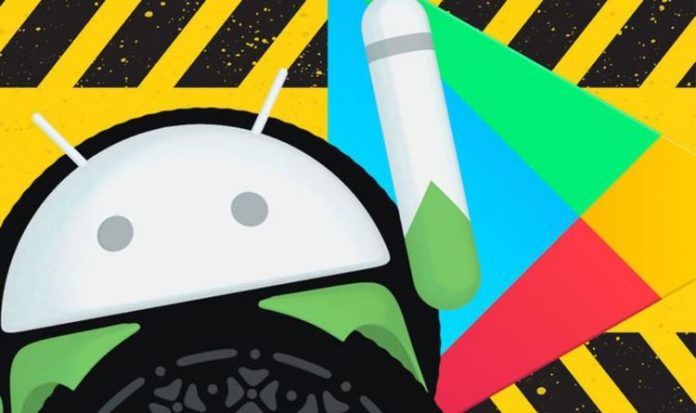Android users are no strangers to receiving security alerts, with these warnings being issued on an incredibly frequent basis. So much so that when you see an Android warning being issued it may feel normal, when it’s anything but. While all Android alerts should be taken seriously, some of these Google Play Store threats cause more damage than others and affect a larger group of users.
Often times after one of these alerts has been highlighted by security experts, the offending app – if it’s on the Google Play Store – gets delisted.
But despite this, the nefarious app can still end up lurking on your Android device if you’ve previously installed it.
Which is why it’s important to nip these threats in the bud.
In case you missed any of these previously issued warnings, Express.co.uk has rounded up some of the starkest warnings of the year to help keep your Android device safe.
READ MORE: Android feature stops working after Google update, but there’s a fix
As the old adage goes, you can’t judge a book by its cover and that’s definitely the case with the first Android warning we’ll be highlighting.
Just last month Avast issued an alert about some innocuous-looking apps found on the Google Play Store, which purportedly offer helpful tools for the hit game Minecraft.
However, as we reported in November, these apps – some of which have been downloading over a million times – secretly sign users up to paid-for subscriptions.
A number of these apps charge a whopping £22 a week, and if an Android user doesn’t spot this it would mean they would be forking out over £1,000 over the course of the year.
Speaking about this threat, Ondrej David, malware analysis team lead at Avast, said: “Scams of this nature take advantage of those who don’t always read the fine print details of every app they download. In this case, young children are particularly at risk because they may think they are innocently downloading a Minecraft accessory, but not understand or may not pay attention to the details of the service to which they are subscribing.”
Here are the offending apps Avast highlighted: Skins, Mods, Maps for Minecraft PE, Skins for Roblox, Live Wallpapers HD & 3D Background, MasterCraft for Minecraft, Master for Minecraft, Boys and Girls Skins, Maps Skins and Mods for Minecraft.
Elsewhere, over the summer Sophos warned about other fleeceware apps found on the Play Store that can seriously cost Google Android users.
The security experts had seen Android users download apps which secretly sign them up to subscriptions that cost over £3,000 per year.
One app that Sophos specifically highlighted was called Montage, which has now thankfully been delisted from the Play Store and had a limited amount of downloads.
Another dangerous Google Play Store threat was highlighted by VPNpro, who found numerous apps riddled with nasty malware.
Besides infecting devices, these pieces of malware were asking for dangerous permissions such as being able to access a device’s camera.
The apps VPNpro highlighted were made developed by Chinese company Shenzhen HAWK – and have been downloaded a staggering 382million times.
VPNpro said: “Our research has uncovered that they’re asking for a huge amount of dangerous permissions, potentially putting users’ private data at risk.
“These dangerous permissions include the ability to make calls, take pictures and record video, record audio, and much more.”
Here are the Android apps that VPNpro highlighted: Sound Recorder • Super Cleaner • Virus Cleaner 2019 • File Manager • Joy Launcher • Turbo Browser • Weather Forecast • Candy Selfie Camera • Hi VPN, Free VPN • Candy Gallery • Calendar Lite • Super Battery • Hi Security 2019 • Net Master • Puzzle Box • Private Browser • Hi VPN Pro • World Zoo • Word Crossy! • Soccer Pinball • Dig it • Laser Break • Music Roam • Word Crush.
Throughout the year, Google has also enforced mass culls to delete a wide range of dangerous apps from the Play Store.
In June over 30 popular apps were removed from the Play Store after it was discovered the software had the ability to bombard users with unwanted adverts and intrusive browser redirects.
The discovery of these malicious adware apps was made by the team at White Ops, with these security experts believing a criminal group was behind the threat.
In total 38 applications were deleted from the Play Store in that round of culls, but not before they were downloaded a total of 20million times.
Here are the names of the offending apps: Yoroko Camera, Solu Camera, Lite Beauty Camera , Beauty Collage Lite, Beauty & Filters Camera, Photo Collage & Beauty Camera, Beauty Camera Selfie Filter , Gaty Beauty Camera, Pand Selife Beauty Camera , Catoon Photo Editor & Selfie Beauty Camera, Benbu Selife Beauty Camera, Pinut Selife Beauty Camera & Photo Editor, Mood Photo Editor & Selife Beauty Camera, Rose Photo Editor & Selfie Beauty Camera, Selife Beauty Camera & Photo Editor, Fog Selife Beauty Camera, First Selife Beauty Camera & Photo Editor, Vanu Selife Beauty Camera, Sun Pro Beauty Cameraa, Funny Sweet Beauty Camera, Little Bee Beauty Camera, Beauty Camera & Photo Editor Pro, Grass Beauty Camera, Ele Beauty Camera, Flower Beauty Camera, Best Selfie Beauty Camera, Orange Camera, Sunny Beauty Camera, Pro Selfie Beauty Camera, Selfie Beauty Camera Pro and Elegant Beauty Cam-2019.
DON’T MISS: Google bans over 240 rule-breaking Android apps – delete them now
And finally, one of the starkest Android warnings of 2020 came at the start of the year – and was issued directly by Google.
It’s rare for the search engine giant to highlight security threats, but this just underlines the threat of it and the work that has been done behind the scenes to keep it at bay.
According to a post published in January, threats on the Google Play Store were being recorded on a daily basis, with one attack that spread the Bread malware designed specifically to slip into the Play Store undetected.
The infamous malware (also known as Joker) has been tracked by Google since early 2017, with the Android makers working hard to identify apps solely created to spread this malicious code.
At the time of publishing their research, Google said a total of 1,700 unique Bread apps had been found and removed from the Play Store.
However, despite the hard work Google Play Protect is putting in to keep the Bread malware at bay there have been a number of apps that slipped through the net.
In September it was revealed six apps containing the sinister Joker malware, which is designed for financial fraud, were spotted on the Play Store.
And one of these apps was downloaded over 100,000 times. Here are the offending apps, which have now been taken down from the Play Store: Safety AppLock, Convenient Scanner 2, Push Message-Texting&SMS, Emoji Wallpaper, Separate Doc Scanner and Fingertip GameBox.




